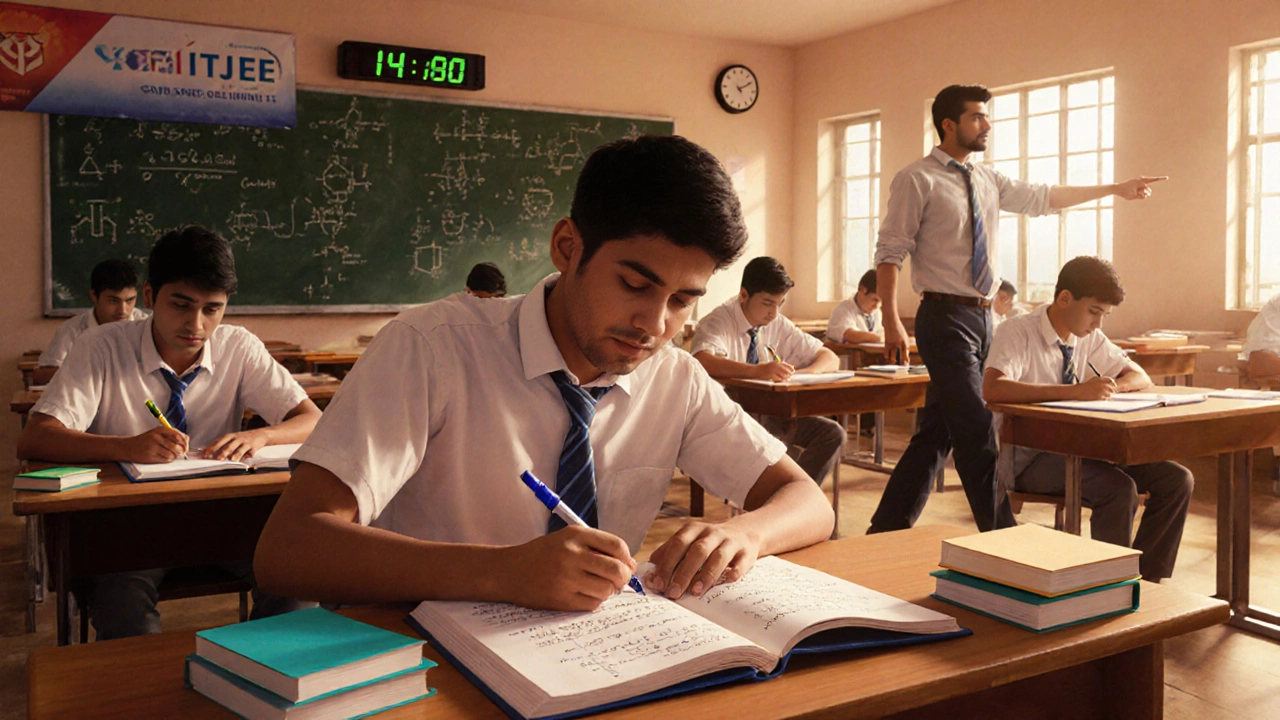JEE Preparation Time Estimator
Your JEE Preparation Timeline
Based on your current preparation level and timeline
Key Takeaways
- Start in Class 11 if you can handle a structured physics‑chemistry‑math (PCM) foundation.
- Class 12 starters need an intensive crash‑course and a solid NCERT base.
- Foundation classes (Class 9‑10) build concepts early but may delay focused JEE practice.
- Choose a coaching institute that follows the NCERT textbooks, the official curriculum for Indian schools and offers regular mock tests.
- Align your study plan with the JEE Main & Advanced timeline for steady progress.
Every year, thousands of aspirants ask the same question: "Which class should I join to start preparing for the IIT JEE?" The answer isn’t a one‑size‑fits‑all; it depends on your current knowledge, study habits, and how much time you can devote. This guide breaks down the three popular starting points - foundation (Class 9‑10), Class 11, and Class 12 - and helps you decide which path maximises your chances of cracking JEE Main and JEE Advanced.
Understanding the IIT JEE Timeline
The IIT JEE is a two‑stage engineering entrance exam in India, consisting of JEE Main and JEE Advanced spans roughly two years of focused preparation. JEE Main is usually held in January and April, acting as a gateway to JEE Advanced, which takes place around May‑June of the same year. Knowing this schedule is crucial because your study milestones should line up with these dates.
Option 1: Foundation Classes (Class 9‑10)
Many coaching chains now offer "Foundation" programs that start as early as Class 9. These classes focus on building a strong conceptual base in physics, chemistry, and mathematics, often using simplified examples and lots of visual aids.
Pros
- Early exposure to IIT‑style problem solving.
- Time to develop analytical thinking before the formal PCM syllabus begins.
- Less pressure - you can afford to explore concepts without the stress of upcoming exams.
Cons
- Curriculum may not align perfectly with the NCERT textbooks, the official curriculum for Indian schools topics covered later in Class 11.
- Longer overall preparation period can lead to burnout if not paced wisely.
- Extra financial investment for a program that some students eventually skip.
Option 2: Class 11 - The Traditional Starting Point
Class 11 is the most common entry point. At this stage, you begin the official PCM syllabus, which maps directly to the concepts tested in JEE Main.
Why Class 11 works
- Direct alignment with the NCERT textbooks, the official curriculum for Indian schools curriculum - every chapter you study will appear in some form in JEE.
- Coaching institutes design their “Class 11” batches around the JEE syllabus, providing focused lectures, assignments, and weekly mock tests.
- Three‑year window (Class 11‑12 + JEE year) allows for gradual strengthening of problem‑solving speed.
Potential pitfalls
- Skipping a strong foundation in Class 10 mathematics can make early Class 11 topics feel overwhelming.
- Relying solely on classroom lectures without regular self‑practice reduces retention.

Option 3: Class 12 - The Late‑Start Strategy
Some students feel ready to begin serious JEE prep only after completing Class 11 board exams. Starting in Class 12 demands a focused, high‑intensity approach.
Advantages
- You already have the complete Class 11 PCM foundation, so you can jump straight into JEE‑level problem solving.
- Less time spent on school curriculum, allowing more hours for JEE mock tests and analysis.
Challenges
- Limited time to cover the vast JEE syllabus - you must prioritise high‑yield topics.
- Risk of burnout due to compressed study schedule, especially if juggling board exam revision.
Comparison of Starting Classes
| Aspect | Foundation (Class 9‑10) | Class 11 | Class 12 |
|---|---|---|---|
| Duration before JEE Advanced | ~3‑4 years | ~2‑3 years | ~1‑2 years |
| Curriculum alignment | Concept‑building, not fully NCERT‑aligned | Fully aligns with NCERT PCM | Builds on completed NCERT PCM |
| Intensity of study | Moderate, spread out | Balanced - classroom + self‑practice | High - crash‑course & mock tests |
| Typical cost (per year) | ₹12,000‑₹20,000 | ₹35,000‑₹55,000 | ₹30,000‑₹45,000 (short‑term intensive) |
| Best for | Students who need early concept reinforcement | Most aspirants aiming for a balanced preparation | Students confident in their Class 11 base and willing to accelerate |
Factors to Consider When Choosing Your Starting Class
Regardless of the year you pick, keep these decision‑makers in mind:
- Current academic strength: If you scored well in Class 10 mathematics, moving directly to Class 11 is safe. Weak scores suggest a foundation stint.
- Time availability: JEE preparation demands 2‑3 hours daily on top of school work. Assess realistic daily slots.
- Coaching quality: Look for institutes that employ faculty experienced in FIITJEE one of India’s leading IIT JEE coaching chains or Aakash renowned for systematic JEE training methodologies.
- Study resources: Regular access to mock tests simulated JEE exams that gauge speed and accuracy is non‑negotiable.
- Financial considerations: Choose a plan that fits your budget without compromising on essential study material.

Recommended Pathways
Path A - Early Starters (Class 9‑10 Foundation)
- Year 1 (Class 9): Focus on fundamental concepts in physics (mechanics basics), chemistry (basic atomic structure), and mathematics (algebra & geometry). Use NCERT + supplementary workbooks.
- Year 2 (Class 10): Strengthen problem‑solving with Olympiad‑style questions; start weekly timed quizzes.
- Year 3 (Class 11): Enroll in a reputable coaching institute that offers a structured Class 11 PCM batch, attend lectures, and take two full‑length mock tests per month.
- Year 4 (Class 12): Intensify practice, focus on JEE‑specific shortcuts, and sit for at least six mock tests before the JEE Main exam.
Path B - Standard Start (Class 11)
- First semester: Complete NCERT chapters, supplement with coaching notes for deep problem sets.
- Second semester: Begin fortnightly mock tests; review mistakes thoroughly.
- Class 12 (first semester): Target high‑weight topics - calculus, vectors, organic chemistry, electromagnetism.
- Class 12 (second semester): Full‑length JEE Main and Advanced mock series (minimum 8 tests).
Path C - Late Start (Class 12)
- First two months: Rapid revision of Class 11 NCERT, focusing on algebra, trig, and basic chemistry.
- Next three months: Intensive problem solving from previous JEE papers; aim for 100+ problems per week.
- Final three months: Daily mock test, analyze performance, and fine‑tune speed strategies.
Essential Resources for All Paths
Regardless of when you start, these tools are indispensable:
- NCERT textbooks: The backbone of any JEE study plan; ensure you master every example and exercise.
- Coaching notes: Papers from FIITJEE renowned for concise, concept‑focused notes or Aakash offering detailed solved examples.
- Online platforms: Websites like Unacademy provides live JEE classes and test series for flexible timing.
- Mock test series: Use the JEE Main Mock Test provided by official NTA and leading coaching institutes to simulate exam conditions.
Common Pitfalls and Pro Tips
Pitfall 1 - Ignoring NCERT: Skipping NCERT chapters leads to gaps in fundamentals. Always complete them before moving to advanced problems.
Tip: Write a one‑page summary after each NCERT chapter; this reinforces key formulas.
Pitfall 2 - Over‑reliance on video lectures: Passive watching doesn’t build problem‑solving muscles.
Tip: Follow the 30‑15‑5 rule - 30 minutes of concept review, 15 minutes of solving related questions, 5 minutes of self‑quiz.
Pitfall 3 - Inconsistent mock testing: Irregular tests give a false sense of readiness.
Tip: Schedule a full JEE mock every weekend; review each paper within 24 hours.
Frequently Asked Questions
Should I start JEE prep in Class 9 or wait for Class 11?
If you enjoy physics, chemistry, and maths and want a head start on concepts, a foundation program in Class 9‑10 can be helpful. However, the most efficient path for most students is to begin serious JEE preparation in Class 11, when the official PCM syllabus aligns with the exam.
Can I crack JEE if I start only in Class 12?
Yes, but you must adopt an intensive schedule: fast‑track revision of Class 11 concepts, daily problem solving, and at least 8‑10 full‑length mock tests before JEE Main. A strong Class 11 foundation is essential.
How many hours should I study each day?
Aim for 2‑3 hours of focused JEE study on school days and 4‑5 hours on weekends. Consistency beats occasional marathon sessions.
What role do mock tests play in my preparation?
Mock tests are your reality check. They develop speed, stamina, and exam mindset. Review each test to understand why mistakes happened and to adjust your study focus.
Is self‑study enough, or do I need a coaching institute?
Self‑study works for highly disciplined students with strong conceptual bases. Most aspirants benefit from a coaching institute that provides structured lectures, regular tests, and doubt‑clearing sessions.
